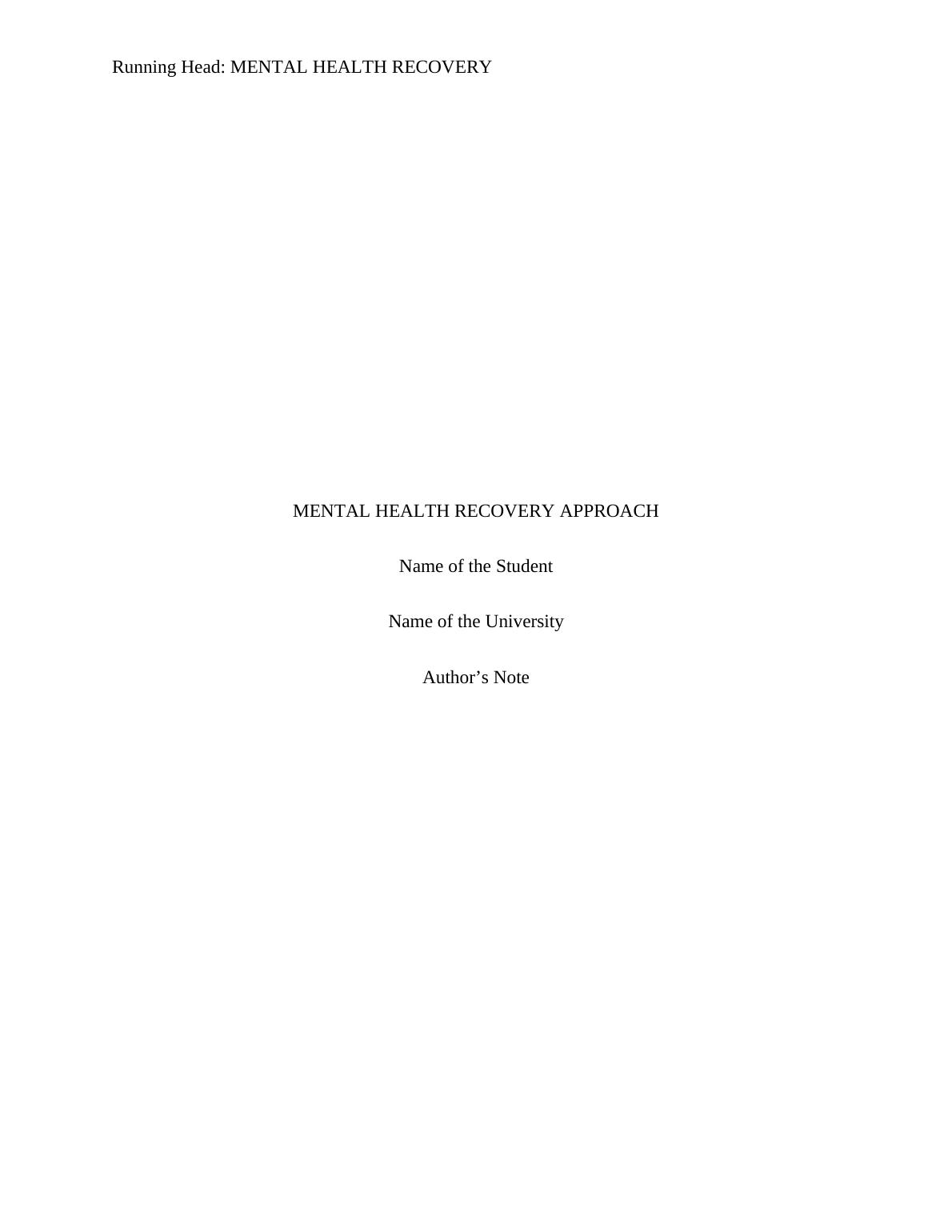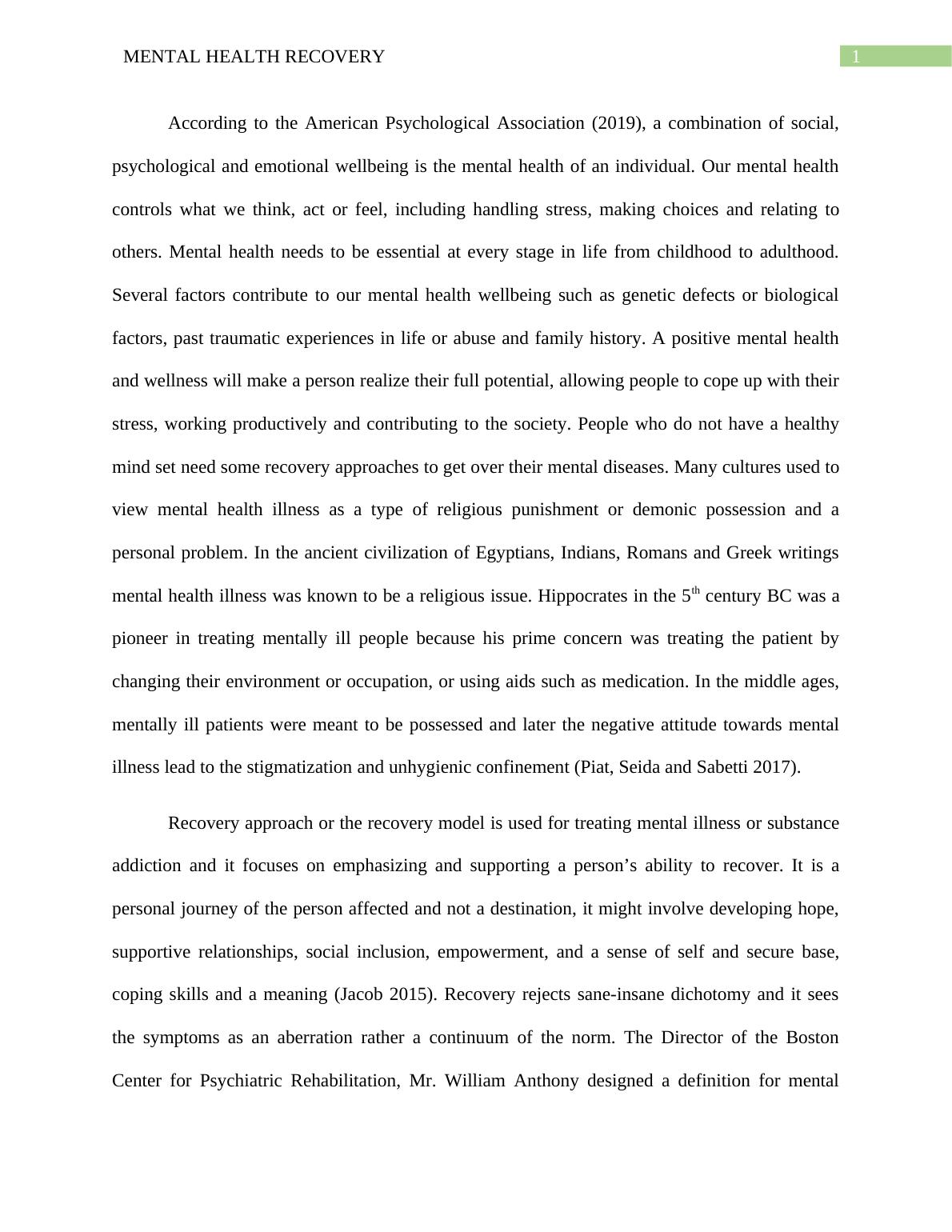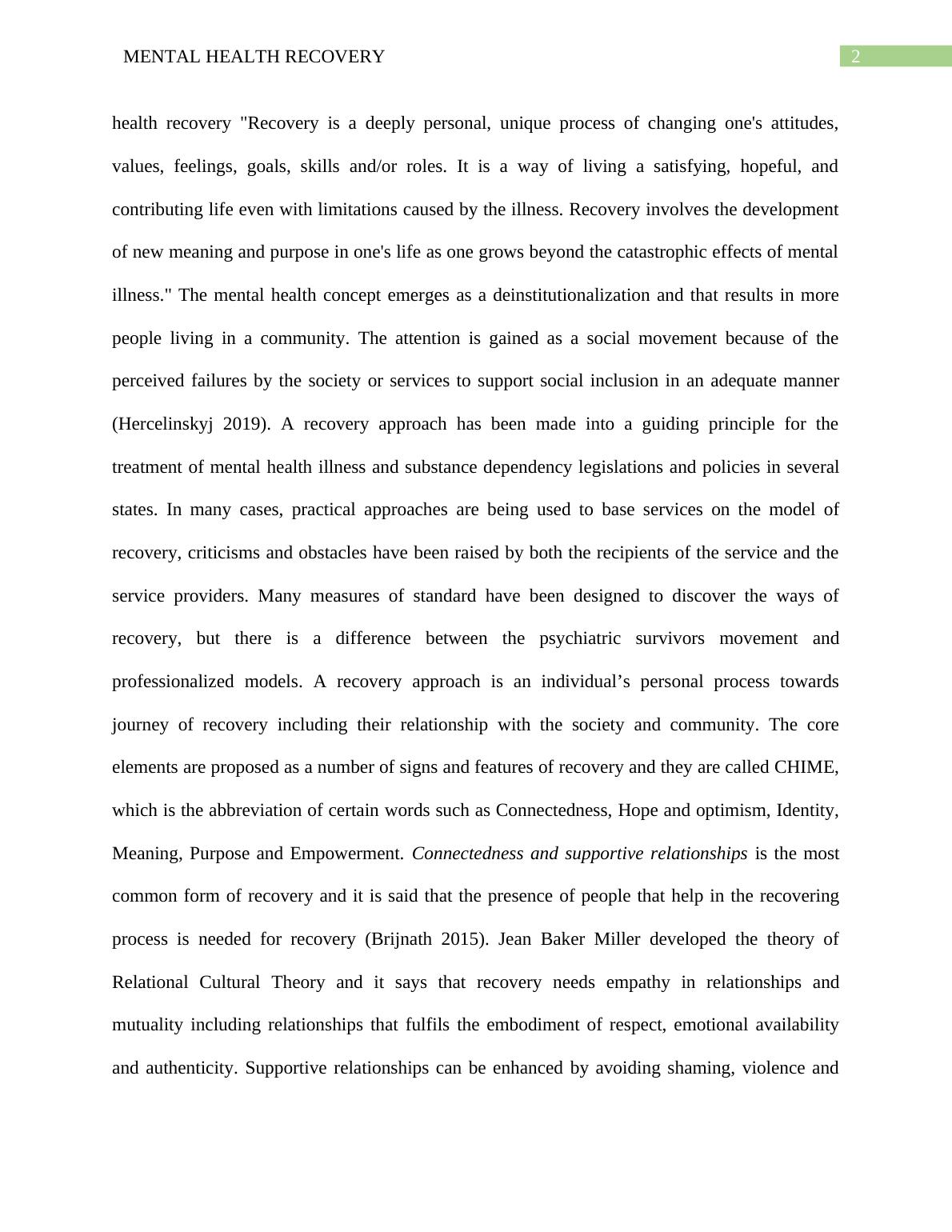Mental Health Recovery Approach America 2022
Added on 2022-09-12
8 Pages2157 Words24 Views
Running Head: MENTAL HEALTH RECOVERY
MENTAL HEALTH RECOVERY APPROACH
Name of the Student
Name of the University
Author’s Note
MENTAL HEALTH RECOVERY APPROACH
Name of the Student
Name of the University
Author’s Note

MENTAL HEALTH RECOVERY1
According to the American Psychological Association (2019), a combination of social,
psychological and emotional wellbeing is the mental health of an individual. Our mental health
controls what we think, act or feel, including handling stress, making choices and relating to
others. Mental health needs to be essential at every stage in life from childhood to adulthood.
Several factors contribute to our mental health wellbeing such as genetic defects or biological
factors, past traumatic experiences in life or abuse and family history. A positive mental health
and wellness will make a person realize their full potential, allowing people to cope up with their
stress, working productively and contributing to the society. People who do not have a healthy
mind set need some recovery approaches to get over their mental diseases. Many cultures used to
view mental health illness as a type of religious punishment or demonic possession and a
personal problem. In the ancient civilization of Egyptians, Indians, Romans and Greek writings
mental health illness was known to be a religious issue. Hippocrates in the 5th century BC was a
pioneer in treating mentally ill people because his prime concern was treating the patient by
changing their environment or occupation, or using aids such as medication. In the middle ages,
mentally ill patients were meant to be possessed and later the negative attitude towards mental
illness lead to the stigmatization and unhygienic confinement (Piat, Seida and Sabetti 2017).
Recovery approach or the recovery model is used for treating mental illness or substance
addiction and it focuses on emphasizing and supporting a person’s ability to recover. It is a
personal journey of the person affected and not a destination, it might involve developing hope,
supportive relationships, social inclusion, empowerment, and a sense of self and secure base,
coping skills and a meaning (Jacob 2015). Recovery rejects sane-insane dichotomy and it sees
the symptoms as an aberration rather a continuum of the norm. The Director of the Boston
Center for Psychiatric Rehabilitation, Mr. William Anthony designed a definition for mental
According to the American Psychological Association (2019), a combination of social,
psychological and emotional wellbeing is the mental health of an individual. Our mental health
controls what we think, act or feel, including handling stress, making choices and relating to
others. Mental health needs to be essential at every stage in life from childhood to adulthood.
Several factors contribute to our mental health wellbeing such as genetic defects or biological
factors, past traumatic experiences in life or abuse and family history. A positive mental health
and wellness will make a person realize their full potential, allowing people to cope up with their
stress, working productively and contributing to the society. People who do not have a healthy
mind set need some recovery approaches to get over their mental diseases. Many cultures used to
view mental health illness as a type of religious punishment or demonic possession and a
personal problem. In the ancient civilization of Egyptians, Indians, Romans and Greek writings
mental health illness was known to be a religious issue. Hippocrates in the 5th century BC was a
pioneer in treating mentally ill people because his prime concern was treating the patient by
changing their environment or occupation, or using aids such as medication. In the middle ages,
mentally ill patients were meant to be possessed and later the negative attitude towards mental
illness lead to the stigmatization and unhygienic confinement (Piat, Seida and Sabetti 2017).
Recovery approach or the recovery model is used for treating mental illness or substance
addiction and it focuses on emphasizing and supporting a person’s ability to recover. It is a
personal journey of the person affected and not a destination, it might involve developing hope,
supportive relationships, social inclusion, empowerment, and a sense of self and secure base,
coping skills and a meaning (Jacob 2015). Recovery rejects sane-insane dichotomy and it sees
the symptoms as an aberration rather a continuum of the norm. The Director of the Boston
Center for Psychiatric Rehabilitation, Mr. William Anthony designed a definition for mental

MENTAL HEALTH RECOVERY2
health recovery "Recovery is a deeply personal, unique process of changing one's attitudes,
values, feelings, goals, skills and/or roles. It is a way of living a satisfying, hopeful, and
contributing life even with limitations caused by the illness. Recovery involves the development
of new meaning and purpose in one's life as one grows beyond the catastrophic effects of mental
illness." The mental health concept emerges as a deinstitutionalization and that results in more
people living in a community. The attention is gained as a social movement because of the
perceived failures by the society or services to support social inclusion in an adequate manner
(Hercelinskyj 2019). A recovery approach has been made into a guiding principle for the
treatment of mental health illness and substance dependency legislations and policies in several
states. In many cases, practical approaches are being used to base services on the model of
recovery, criticisms and obstacles have been raised by both the recipients of the service and the
service providers. Many measures of standard have been designed to discover the ways of
recovery, but there is a difference between the psychiatric survivors movement and
professionalized models. A recovery approach is an individual’s personal process towards
journey of recovery including their relationship with the society and community. The core
elements are proposed as a number of signs and features of recovery and they are called CHIME,
which is the abbreviation of certain words such as Connectedness, Hope and optimism, Identity,
Meaning, Purpose and Empowerment. Connectedness and supportive relationships is the most
common form of recovery and it is said that the presence of people that help in the recovering
process is needed for recovery (Brijnath 2015). Jean Baker Miller developed the theory of
Relational Cultural Theory and it says that recovery needs empathy in relationships and
mutuality including relationships that fulfils the embodiment of respect, emotional availability
and authenticity. Supportive relationships can be enhanced by avoiding shaming, violence and
health recovery "Recovery is a deeply personal, unique process of changing one's attitudes,
values, feelings, goals, skills and/or roles. It is a way of living a satisfying, hopeful, and
contributing life even with limitations caused by the illness. Recovery involves the development
of new meaning and purpose in one's life as one grows beyond the catastrophic effects of mental
illness." The mental health concept emerges as a deinstitutionalization and that results in more
people living in a community. The attention is gained as a social movement because of the
perceived failures by the society or services to support social inclusion in an adequate manner
(Hercelinskyj 2019). A recovery approach has been made into a guiding principle for the
treatment of mental health illness and substance dependency legislations and policies in several
states. In many cases, practical approaches are being used to base services on the model of
recovery, criticisms and obstacles have been raised by both the recipients of the service and the
service providers. Many measures of standard have been designed to discover the ways of
recovery, but there is a difference between the psychiatric survivors movement and
professionalized models. A recovery approach is an individual’s personal process towards
journey of recovery including their relationship with the society and community. The core
elements are proposed as a number of signs and features of recovery and they are called CHIME,
which is the abbreviation of certain words such as Connectedness, Hope and optimism, Identity,
Meaning, Purpose and Empowerment. Connectedness and supportive relationships is the most
common form of recovery and it is said that the presence of people that help in the recovering
process is needed for recovery (Brijnath 2015). Jean Baker Miller developed the theory of
Relational Cultural Theory and it says that recovery needs empathy in relationships and
mutuality including relationships that fulfils the embodiment of respect, emotional availability
and authenticity. Supportive relationships can be enhanced by avoiding shaming, violence and

End of preview
Want to access all the pages? Upload your documents or become a member.
Related Documents
Iranian Journal of Psychiatry and Behavioral Scienceslg...
|9
|2298
|16
Minimization of Cannabis use among adolescents - Addiction & systemic approach in the treatmentlg...
|13
|1194
|95
(PDF) Mental health challenges and possible solutionslg...
|11
|2875
|60
Mental Illness and Recovery: Lived Experiences and Principles of Recovery-Oriented Mental Health Practicelg...
|9
|2653
|374
Recovery from Mental Illness through Healthcare Practicelg...
|12
|513
|117
Emerging Best Practices in Mental Health Recoverylg...
|8
|2367
|21
